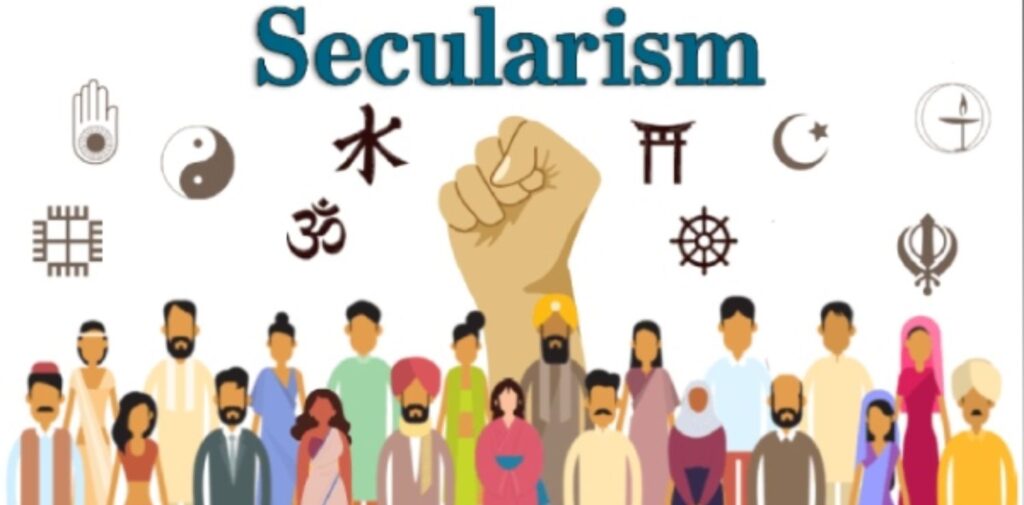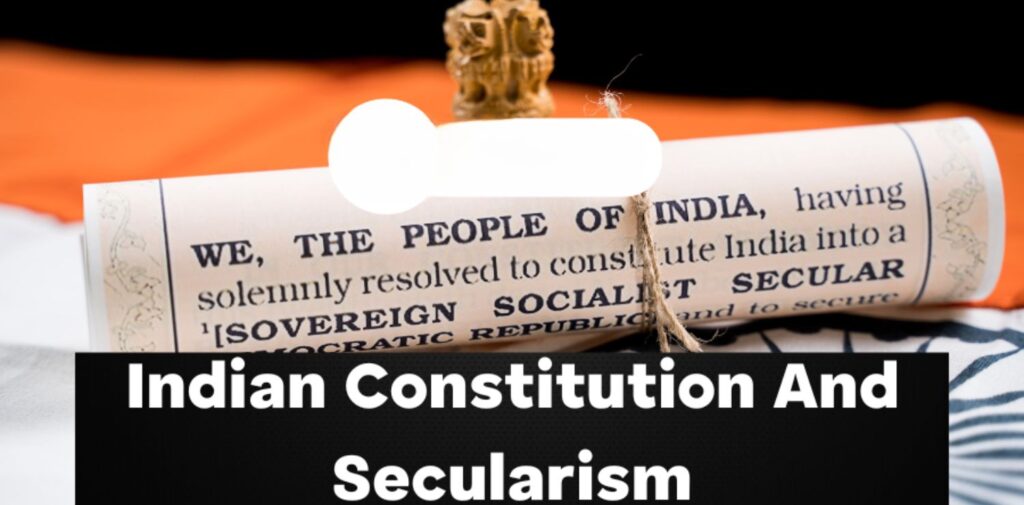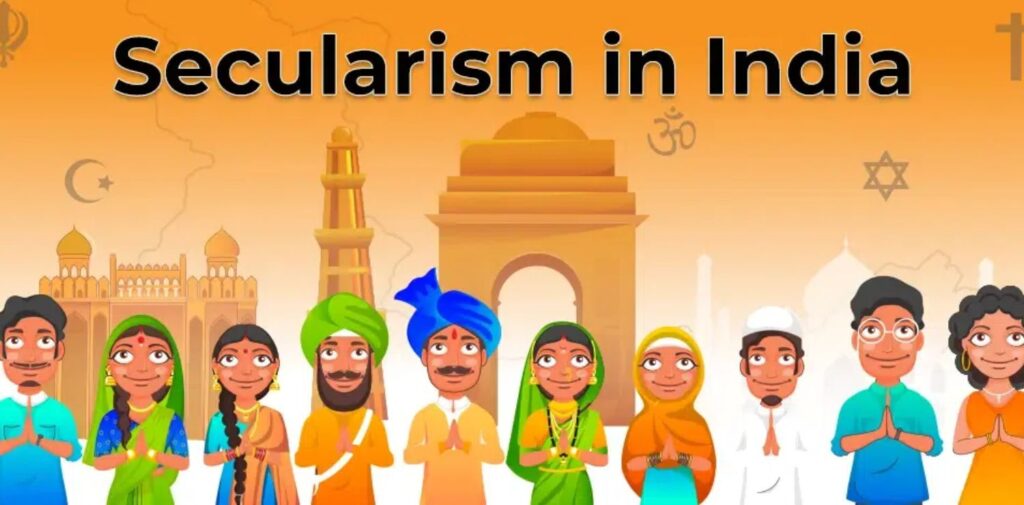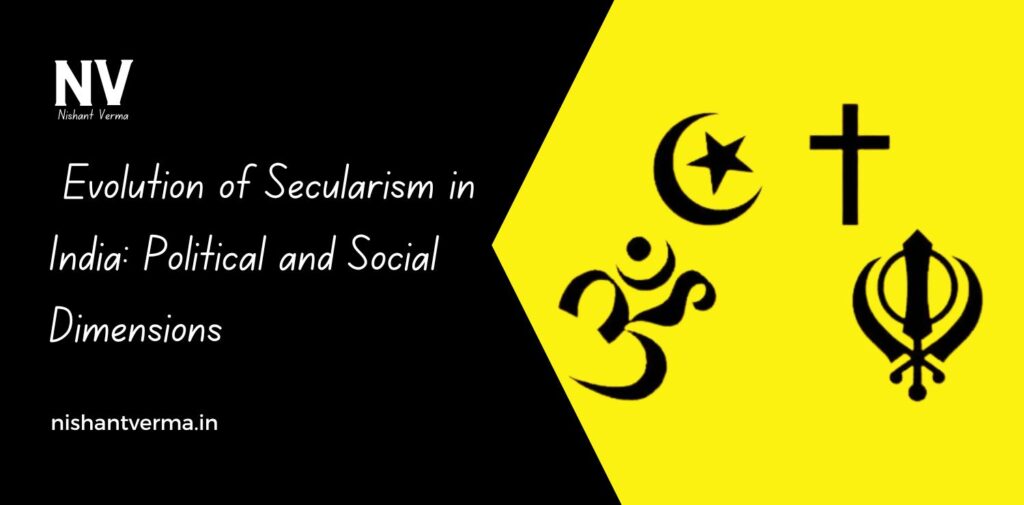Secularism is a term that holds a very important place in India’s history, especially when we talk about its independence and the post-independence period. Secularism is the idea that the government or state should not favor any religion. In a country like India, with so many different religions and cultures, secularism helps maintain peace, unity, and fairness. Let’s take a journey through the evolution of secularism in India, understanding how it grew over time and how it continues to shape the nation today.
What is Secularism?
Before we dive deep, let’s first understand what secularism means. Secularism refers to the separation between religion and government. In simpler terms, it means that the government doesn’t take sides in religious matters. It treats people of all religions equally and doesn’t allow any particular religion to control how the government works.
In a country like India, where people follow different religions like Hinduism, Islam, Christianity, Sikhism, Buddhism, and many others, secularism ensures that no religion is given special treatment. It ensures that everyone is treated fairly, no matter what religion they follow.

The Birth of Secularism in India
Secularism in India didn’t just appear overnight. It has a long history that evolved during the colonial rule by the British. The British rulers often used religion to divide the people of India. They saw the differences between Hindus and Muslims, for example, as a way to control the country. This policy of “divide and rule” caused a lot of tension between different religious groups.
During this time, many Indian leaders realized that religion should not divide the country. They believed in a vision where all communities, regardless of their religion, could live together peacefully. This idea slowly grew into the concept of secularism, where the government would stay neutral and treat every religion equally.
Secularism in the Indian Independence Movement
The fight for India’s independence was also a fight for secularism. Leaders like Mahatma Gandhi, Jawaharlal Nehru, and Sardar Patel believed that India’s future depended on religious harmony. Gandhi, for example, always emphasized that people of different religions should respect each other. He practiced what he preached by often reaching out to people from all religions to create unity.
Jawaharlal Nehru, India’s first Prime Minister, was a strong advocate of secularism. He believed that India should not be divided based on religion. Nehru’s vision was for India to be a democratic country where all citizens, regardless of their religion, could live together and work towards the country’s progress.
The Constitution of India and Secularism
One of the most important steps in making secularism a part of India’s political system was the adoption of the Indian Constitution in 1950. Dr. B.R. Ambedkar, the main architect of the Constitution, made sure that secularism was a central part of the document.
The Constitution of India guarantees freedom of religion. This means that every citizen in India has the right to follow any religion they choose. At the same time, it ensures that the government will not favor any one religion over another. This is what makes India a secular state. Secularism in the Constitution helps create a system where people from all religions can live peacefully without fear of discrimination.

Secularism in Practice: Challenges and Growth
While secularism was enshrined in the Constitution, the real test came in how it was put into practice. Over the years, India has faced many challenges related to religion. At times, tensions between different religious groups have led to violence and conflicts. But despite these challenges, India’s commitment to secularism has remained strong.
One of the biggest tests for secularism came in the 1990s with the rise of religious movements and political parties that tried to promote one religion over others. For example, there were movements that pushed for the recognition of Hinduism as the official religion. This led to debates about whether secularism was being followed properly.
However, India’s democratic system, with its strong legal framework and a commitment to equal rights for all citizens, has continued to uphold secular values. Political parties, while often influenced by religion, have had to balance their religious affiliations with the need to appeal to all citizens. This has helped maintain secularism as an important principle in Indian politics.
Social Dimensions of Secularism in India
Secularism in India is not just about politics; it also affects the social fabric of the country. The diversity in India’s culture, language, traditions, and, of course, religion, makes it a unique nation. In a society like India’s, secularism helps in building a sense of unity and togetherness.
India’s secularism encourages people to respect each other’s beliefs. It has helped in promoting interfaith dialogues, where people from different religions talk and understand each other better. This has led to more social harmony and reduced religious tensions over time.
In everyday life, secularism in India allows people to freely celebrate different festivals, no matter their religion. For example, Diwali, Eid, Christmas, and Gurpurab are celebrated across India by people of all communities. This helps create a sense of unity, where people see their differences as a strength rather than a weakness.
Secularism Today: The Ongoing Struggle
Even today, secularism faces challenges in India. In recent years, some incidents have sparked debates about the state of secularism in the country. Some groups have attempted to use religion to gain political power or create divisions in society. However, there are also many people and organizations working hard to protect India’s secular values.
The government continues to work on laws that promote religious freedom, and the courts also play a vital role in protecting secularism. The media, education, and civil society groups also play important roles in raising awareness about the importance of secularism in India.

The Importance of Secularism for India’s Future
Secularism is crucial for the future of India. As the country continues to grow and evolve, it must stay committed to its values of religious equality and freedom. In a world where many countries face religious conflicts, India’s secularism can be an example for others to follow.
For children growing up in India, understanding the importance of secularism means learning to respect and value people from all religions. It is important to understand that our strength lies in our diversity, and secularism helps us embrace this diversity with love and respect.
Conclusion: Evolution of Secularism in India
Secularism is one of the cornerstones of India’s democracy and social harmony. From the time of British colonial rule to the present day, secularism has been a guiding principle for Indian politics and society. It ensures that all religions are treated equally and that people from different backgrounds can live together peacefully.
The evolution of secularism in India has not always been easy, and there have been many challenges along the way. However, with the help of strong leaders, a democratic Constitution, and the collective efforts of citizens, secularism continues to shape India as a nation that celebrates its diversity. By embracing secularism, India can continue to move forward as a strong, united, and peaceful country for generations to come.




